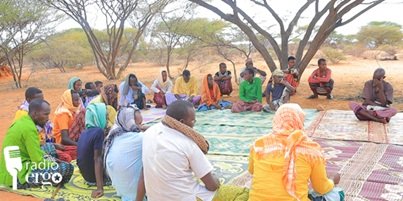(ERGO) – A community youth group in Dadaab has been shining a spotlight on the growing use of harmful substances among Somali refugees in the camps in northern Kenya, especially jobless young men.
The Youth Organisations’ Alliance carried out a study across all camps in the Dadaab complex over seven months, finding that substance abuse had increased rapidly over the past two years, leading to high levels of dysfunction within the society.
According to Mohamed Abdullahi Jimale, chairman of the group, up to 80,000 individuals in the camps – around a fifth of the population – struggle with drug use and addictions that often cause family break-ups and contribute towards violent incidents such as assault and robbery.
“When we collected data, it became clear that the number of people, especially young people, using drugs has increased. The reasons include widespread unemployment in the camps. Organisations used to provide job opportunities for young people, but now they face financial difficulties and can’t offer jobs.
There is also frustration among young people because their second hope of migrating abroad has gone. These factors have led many of them to start using drugs,” Mohamed said.
One substance abuser willing to share his story is 24-year-old Ali Jama (not his real name), who has been using hashish and alcohol regularly for three years.
“I have to use it every day because if I don’t, I get restless, my anger increases, and I become impatient. That causes me to fight and argue with people around me. I smoke at least 15 cigarettes a day, and it’s the same with hashish. I can go a few days without khat though,” Ali admitted.
On days when he can’t get a fix he says he can’t function properly and experiences mood swings that have led him to become aggressive and even harm someone passing by. He has been kicked out of the family home because of his behaviour and hangs around the camps begging for money to buy substances.
“My relationship with my parents has greatly deteriorated,” he said. “You can trust someone before they become a drug addict, but once you’re addicted that trust is lost. Everyone sees you as someone who has lost their life and cannot achieve anything.”
Ali said he realises his family ostracised him hoping that he would quit, but he cannot stop. Having graduated from high school in 2020, he had been expected to attend university as he was a good student and his family had high hopes for him.
He once had a job designing business advertisements, earning 5-7,000 Kenyan shillings that contributed towards his education and the household needs. However, he couldn’t hold down the job due to his addiction.
Ali said his friends introduced him to substances when he was looking for escape from the anxiety he was feeling about wanting to leave the dismal camps and go abroad, whilst not having the money or means to do so.
“I know I’m on the wrong path but I pray that God that opens a door of good for us and that we get out of this. No one likes it, but circumstances and times have led to it. Many things pushed us into using substances. Personally, what pushed me was that I couldn’t find anything to do,” he said.
One camp resident who managed to turn around is Mohamed Elmi Jama, who kicked his drug abuse in 2024 after realising the damage it had caused him over four years of addiction. He said since quitting, he has started a better life.
“When I quit drugs, I had healthy sleep, I eat well, and my relationship with my mother and siblings has improved. I returned home, my mother loves me, my father loves me. I became a responsible man who works daily and earns a living from the city, and I am trusted,” Mohamed told Radio Ergo.
Mohamed spent two periods in prison after being convicted for physical assault and injury of others while under the influence of drugs. His parents threw him out of the house.
“I faced a lot of trouble I can’t forget. I almost went mad. I used to fight people. I felt confusion, worry, anxiety, paranoia, suspicion. Sometimes I fought people, I hit three, stabbed one, and was imprisoned in Garissa for six months. Drugs caused great harm to my life,” he said, recalling his dark days with sadness.
He found a job with a construction company owned by relatives that helped him move forward. They pay him 15,000 Kenyan shillings a month. This year, he has been contributing to the expenses of his 10-member family household by giving his mother 7,000 shillings a month.
Mohamed has become one of the youth organisation campaigners engaging in awareness raising in the camps. They present the array of risks of substance abuse and offer advice to other young people on how to quit.
The group aims to stem the rising tide of addictions in the camps, although unemployment and despondency among refugees could make this a losing battle.
Dr Mohamed Abdi Ibrahim, manager of Al-Baqra health centre in Hagadera camp, said a wide range of substances were in use among the refugees, from khat, cigarettes, hashish, and alcohol, to prescription drugs like painkillers and mental health medication. He warned of the physical and mental risks of substance abuse.
Source: Radio Ergo


Leave a Reply